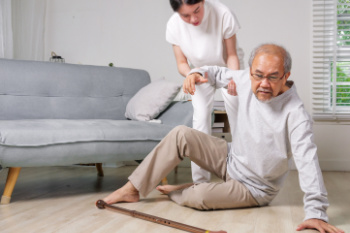Risk Factors for Falling
Tuesday, 16 April 2024 00:00
As people age, the risk of a fall increases, but it should not be seen as inevitable. Falls can be caused by various factors, including weak muscles, poor balance, and dizziness. Foot problems like pain or deformities, and cognitive issues such as memory loss, and vision and hearing impairments, can also contribute to the risk of falls in seniors. Medications that induce drowsiness, excessive alcohol consumption, and certain bladder or bowel conditions can increase the likelihood of falling. Falls often result from an interaction of these factors, with a higher number of risk factors further elevating the potential for falls. In addition, falls can sometimes signal underlying health issues like constipation, infections, dehydration, or sudden confusion. A podiatrist can provide expert advice and interventions to address foot-related problems, improve balance, and reduce the risk of future falls. If instability causes you to lose your balance or fall frequently, it is suggested that you schedule an appointment with a podiatrist for a thorough exam and options for treatment.
Preventing falls among the elderly is very important. If you are older and have fallen or fear that you are prone to falling, consult with Milos Tomich, DPM from Dr. Tomich Foot & Ankle Health Center. Our doctor will assess your condition and provide you with quality advice and care.
Every 11 seconds, an elderly American is being treated in an emergency room for a fall related injury. Falls are the leading cause of head and hip injuries for those 65 and older. Due to decreases in strength, balance, senses, and lack of awareness, elderly persons are very susceptible to falling. Thankfully, there are a number of things older persons can do to prevent falls.
How to Prevent Falls
Some effective methods that older persons can do to prevent falls include:
- Enrolling in strength and balance exercise program to increase balance and strength
- Periodically having your sight and hearing checked
- Discuss any medications you have with a doctor to see if it increases the risk of falling
- Clearing the house of falling hazards and installing devices like grab bars and railings
- Utilizing a walker or cane
- Wearing shoes that provide good support and cushioning
- Talking to family members about falling and increasing awareness
Falling can be a traumatic and embarrassing experience for elderly persons; this can make them less willing to leave the house, and less willing to talk to someone about their fears of falling. Doing such things, however, will increase the likelihood of tripping or losing one’s balance. Knowing the causes of falling and how to prevent them is the best way to mitigate the risk of serious injury.
If you have any questions, please feel free to contact one of our offices located in Milwaukee and Wauwatosa, WI . We offer the newest diagnostic and treatment technologies for all your foot care needs.




